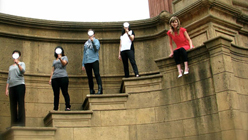San Francisco’s EXIT Theatre has been producing DIVAfest since 2002, a festival of new plays and other performance pieces by and about women. But the 12th annual DIVAfest comes at a particularly fortuitous time, when the theater community at large is deeply embroiled in a discussion about the underrepresentation of women in theater — too few roles for women in the plays being produced, too few of which are written by women. You can catch up on the discussion on blogs such as Works by Women San Francisco and the Counting Actors Project.
This year’s fest is an eclectic mix. There are just two full plays: Melissa Fall’s black comedy You’re Going to Bleed and The Helen Project, Megan Cohen and Amy Clare Tasker’s deconstruction of the myth of Helen of Troy. Other components include the burlesque cabaret Rebel Without a Bra, a work-in-progress series called DIVAs Tell All, a Performance Art Showcase and Songwriter Saturdays, plus a feminist theater symposium, a gallery show and more.
Calling The Helen Project a play doesn’t seem quite right. Cohen and Tasker describe it as a “Build-Your-Own-Helen-Play Kit,” a “modular text” made up of fragments patched together into an hour of overlapping monologues from the point of view of Helen of Troy. The first edition was unveiled on the first weekend of the festival, May 10-11, 2013 and a completely different version will be shown two weeks later, on May 24-25. The project also exists online as a piece of interactive fiction that you choose your own route through by clicking on keywords.
By way of full disclosure, I should say that I wrote a very different play about Helen that will have a staged reading as part of the SF Olympians festival this November, and Cohen is also part of that same festival, writing about Odysseus.
Directed by Tasker, the live version of The Helen Project is set in a bedroom populated by five women who are all Helen, different versions of her at different points in her story. One of them wears a red dress; the others are all in gray shirts and blue jeans. None of them look anything alike, which seems appropriate for the archetype of the most beautiful woman in the world. Sarah Moser, the one in the dress, is the Face, who speaks primarily in lines from Christopher Marlowe’s play Doctor Faustus (“Was this the face that launch’d a thousand ships”) and watches the other Helens very closely, sometimes sadly, sometimes with sly amusement. She seems to represent the myth of Helen, the idea of her, while the others are rooted in particular moments before and after the Trojan War.



